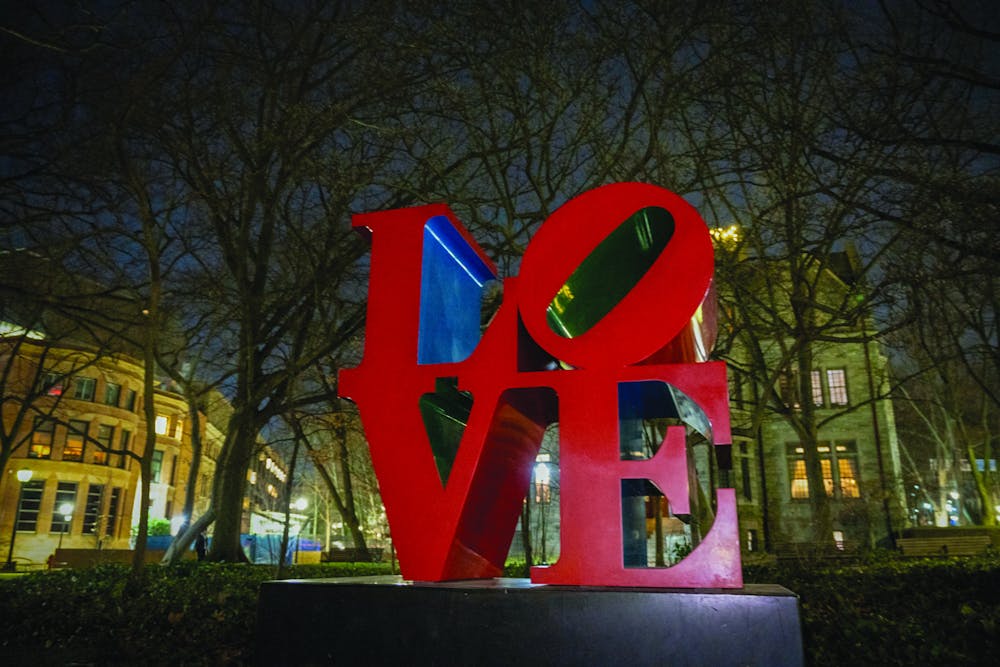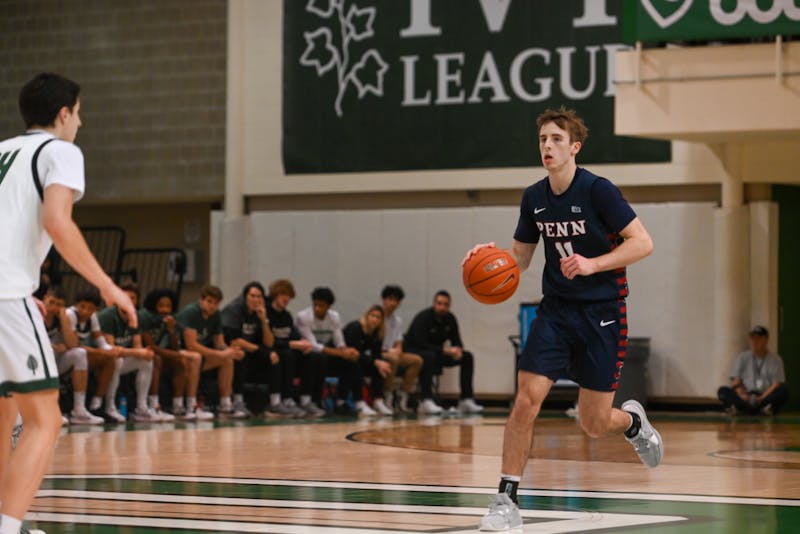
While other Ivy League schools take pride in their high marriage rates between students (50% of Princeton students marry another Princeton student), the college marriage market of the elite seems to take less prominence at Penn.
In our limited Penn experience, committed relationships are rare — Penn students are the least likely to get married in the Ivy League, after all. Penn hookup culture is rampant, and it seems no one wants anything “serious.” While friends from home ask, “Have you found your future husband?” friends at Penn discourage “dating” for any amount of time longer than a weekend.
As our cultural attitudes around dating constantly fluctuate, we have little authority in declaring that commitment is the best way to find love and satisfaction. Maybe we don’t need to “go steady,” but it’s worth figuring out why we’re so afraid to.
At the heart of the issue is Penn’s hyper-individualistic culture, which leaves little room for commitment, love, or fulfillment.
Penn students operate almost solely for our own gain. We are obsessed with what clubs and connections can give us rather than what we can contribute in return. We’re all sharks, fighting mercilessly for our own survival, not concerned about anything but ourselves. Meeting people is more about the connections they offer rather than the value of the relationship itself. When we volunteer, we do it for our resumes, not because we are convinced that we are helping to better our community. If we really wanted to make a difference, we would have to sacrifice something — time or comfort, something few are willing to do in the self-centered world of our college.
Penn’s preprofessional campus is obsessed with the allocation of our time. We squeeze coffee chats in the 15-minute breaks between our consulting club and superficial volunteering, allowing networking goals to take precedence over actual conversation, connection, and bonding. We pack our Google Calendars full until we don’t have time to think about who we are outside of those colored blocks, forgetting that what we take away from the college experience is not the clubs we joined but the people we formed relationships with.
If we cannot even sacrifice time to practice our ethics, how are we supposed to engage in meaningful relationships, the basis of which depends on sacrificing part of ourselves to make us, and the other person, better?
In Penn’s dating scene, self-preservation is the priority; never text first, never reply quicker than they did, and whatever you do, never — under any circumstances — admit you actually like them. Demonstrating that you care more than the person you’re involved with would be losing the upper hand.
Don’t you see it? We’re treating our relationships like a business contract, negotiating terms, all in the name of preserving our own assets. In the economy of Penn dating, the moment you “catch feelings” is the moment your stock plummets. Perhaps we’ve corporatized, or rather Whartonized, connections with one another. It’s become embarrassing to show vulnerability because it’s a liability in our performative dance of indifference. Students are constantly projecting nonchalance and apathy in order to be the one that doesn’t “lose.”
It’s exactly this fear of losing that’s preventing so many of us from genuine connection. Losing control, losing power, losing the upper hand in a dynamic where caring too much feels like a weakness. “Ghost before you get ghosted. Leave before they can leave. Drop them before you get dropped.” Penn’s culture is more about having to stay single, stay winning, and stay preserving our egos.
But since when did maintaining the upper hand outweigh finding the love (or loves) of your life? We grew up watching characters race through the streets (“When Harry Met Sally”), confess their love over an intercom (“10 Things I Hate About You”), or write a letter every day for a year (“The Notebook”). These cinematic characters put their egos aside, willing to risk embarrassment for connection, something bigger and more fulfilling than self-interest.
It’s not “negotiate in love,” it’s “fall in love.” Jump before you look. Speak before you think.
We learn to love from the people who love us. Those who love you don’t hesitate to help you in a crisis. Our best friends don’t wonder if caring about us makes them look weak.
People who care for us are willing to sacrifice their needs for us. We should be willing to sacrifice our comfort in exchange for something greater, too: a community based on an ethic of love. Relationships are a transformative force, and we should be prioritizing personal relationships over material advancement.
Sure, this all sounds right, but how? We can’t single-handedly change the culture of nonchalance that our generation is so attuned to. However, we can on Penn’s campus. Penn isn’t merely Locust Walk and Huntsman Hall. Penn is us.
Our advice: Reject the instinct to save yourself. Text first and respond fast. Admit you like them. Take the risk even if it makes you feel vulnerable. Vulnerability doesn’t guarantee falling in love, but preserving our egos at all costs guarantees loneliness. If we treat one aspect of our lives like a business deal, we risk treating our relationships like one, too.
Human connection can’t be a game where we save our assets. The apathy wars are killing our ability to connect, and Penn continues to be a battlefield. Be a real soldier and take the risks, not just for yourself, but for others who reap the benefits of your love, too.
TIYYA GEIGER is a College first year from Lancaster, Pa studying political science and history. Her email address is tiyyag@sas.upenn.edu.
PIPER SLINKA-PETKA is a College first year from West Virginia studying health and societies. Her email address is pipersp@sas.upenn.edu.
The Daily Pennsylvanian is an independent, student-run newspaper. Please consider making a donation to support the coverage that shapes the University. Your generosity ensures a future of strong journalism at Penn.
Donate








